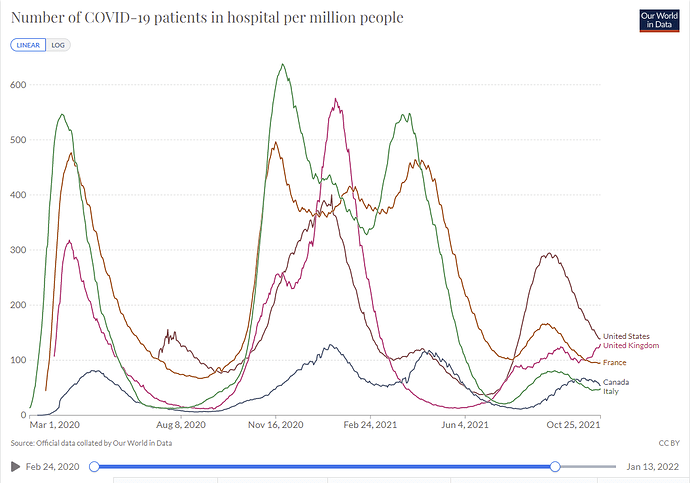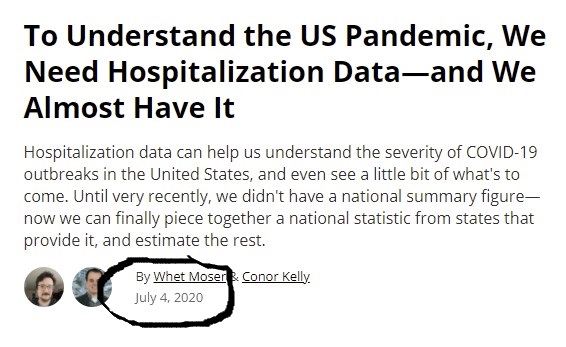Is there a reason to hold off on testing because you might get a false negative if it’s too soon?
Being an avid reader of the thread, I think NotBruceZ is more concerned that his recent booster might give a false positive
I do not think vaccines can be detected by LFT or PCR. Would be the first I’ve heard of it anyway.
Oh ok that’s what you’re complaining about? That looks like a dataset from the feds, which trump took a stupidly long time for hospitalization data to get grouped together. Hospitalization data still existed. It was reported nicely at covidtracking.com
Testing in early days took a week plus to come back, so patients without symptoms weren’t tested, but still segregated
Here’s the timeline.
Sunday - Travel to Vegas with three friends, karaoke bar that night
Monday - Spend most of the day apart, hit Fremont Street at night, then go to strip club. (Story coming to my thread.) Friend who pozzed gets lap dance
Tuesday - Eat in a small enclosed private room with the three friends. Two friends leave. Pozzed friend stays.
Wednesday - Give friend a tour of a few card rooms
Thursday - Fly back with friend (twenty rows apart). Drive 90 minutes with him.
He had symptoms late last night and tested positive this morning.
I am concerned about both a false positive from being boosted two weeks ago and a false negative if I got it from the car ride and it is too soon to test.
The false positive doesn’t exist from the vaccine. I’d test 3-5 days after last exposure, and, if symptom free, assume I’m good to go
After looking around, it seems I was vaguely remembering that the vaccine could cause one to test positive on an antibody test.
All of them do that. They work in part by inducing antibodies. No one should be doing antibody testing for acute infection
I’m not complaining, just slightly surprised, that’s all. Similar to that time I read our roving ER doc hadn’t had a test in the ~first year of the pandemic, rapid test or otherwise.
I mean, we’re in a pandemic and asymptomatic transmission is a thing. I would’t want to visit a hospital with a non-life threatening illness and expect to be given covid by a hospital porter, let alone a nurse or doc but perhaps I expect too much.
I don’t think this necessarily means we’ll stop seeing covid death numbers in 2 weeks. The aggregators we all get case and death metrics from in turn get their data from state and county level health departments, right? So I’m unclear on the significance of this change.
They’re dropping a bunch of other things that also seem pretty important (e.g., ventilators in use, inventory of remdesivir as well as a bunch of PPE items, whether there’s a critical staffing shortage, etc.)
It almost seems like they’re saying these factors will not “inform the federal response” so they’re no longer needed at the federal level, but this seems pretty dumb. I guess I’d like to hear somebody who knows what’s going on defend these changes and explain the reasoning and expected impact.
Going to a hospital puts you at risk of catching all kinds of terrible diseases even in non-COVID times.
But that data did exist Churchill. It’s just not in the dataset you’ve used. Patients were isolated based on symptoms until testing came back. That could be two weeks or a few days.
I have a story about when we had to destroy our isolation system in March 2020 because we had too many patients and we ran out of oxygen tanks. It was easily the worst day of the pandemic for me.
You’ve just left a link to the front page of a website (that was closed in March 2021)
Maybe you are mistaken as according to covidtracking, they didn’t have the data pre July 2020 either? And even then, they are guestimating.
Hospitals were doing testing then and covidtracking has data on hospitalization before July 2020. They wanted better data.
https://coronavirus.1point3acres.com/en
Another webpage with hospitalization data going back to Day 1.
Yup early on this had to be collected from local public health sources and it was super annoying. Everyone had different rules, reports and etc. Trump admin really dragged their feet.
Antibody test, yes. Antigen test, no. The rapid home tests are antigen tests.
Given your description of your exposure, I’d assume I had it and conduct myself accordingly for three days, then test for a few days in a row. If having symptoms or returning a positive on an antigen test, I’d get a PCR as confirmation.
I have two rapid home tests and am unsure about my ability to acquire more.
Amazon has had them pretty consistently: https://www.amazon.com/iHealth-COVID-19-Authorized-Non-invasive-Discomfort/dp/B09KZ6TBNY/ref=sr_1_1?crid=3A9AIAFX1H41V&keywords=At+home+covid+test&qid=1642201478&sprefix=at+home+covid+test%2Caps%2C80&sr=8-1
Yes, so definitely wait three days, testing too early would show a negative result even if you’re infected.

